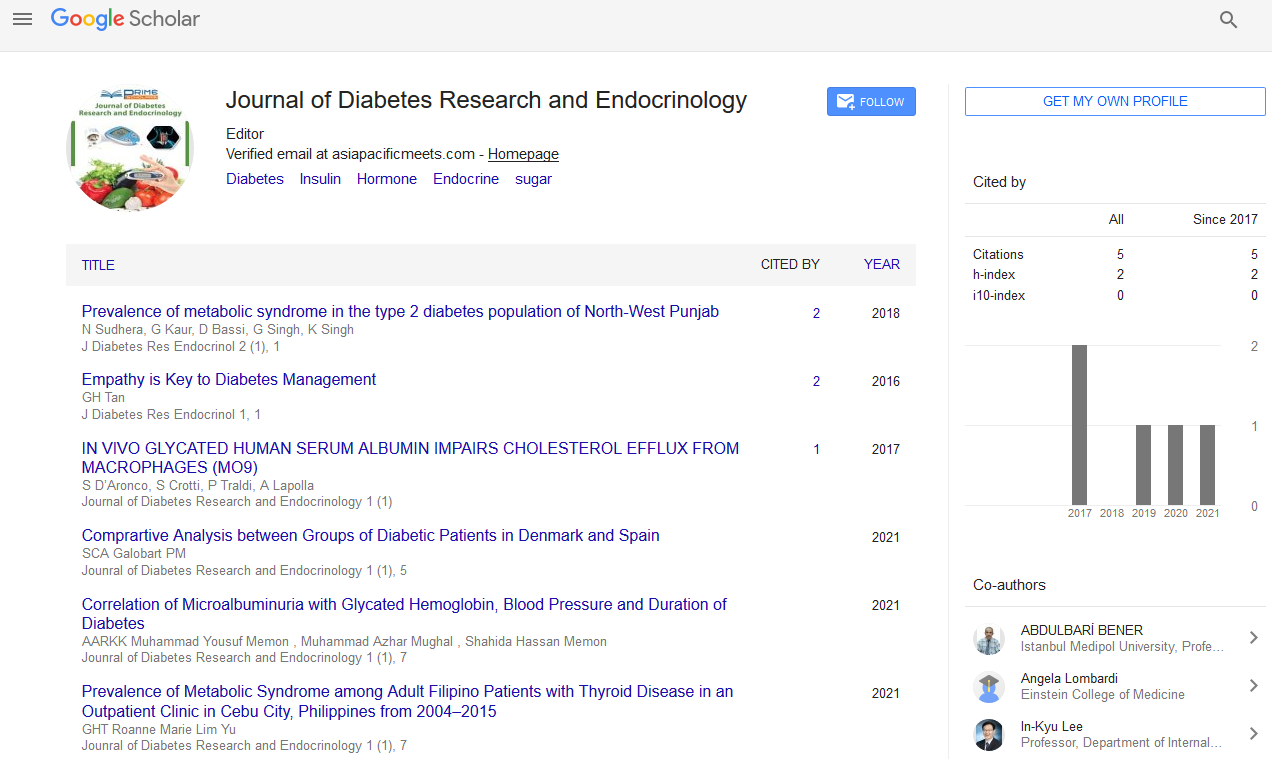Commentary - (2023) Volume 7, Issue 1
A Person without Diabetes Insipidus would Produce more ADH and Store as much Water Possible
Mirjam Christ-Crain*
Department of Endocrinology, University of Basel, Switzerland
*Correspondence:
Mirjam Christ-Crain,
Department of Endocrinology, University of Basel,
Switzerland,
Email:
Received: 02-Jan-2023, Manuscript No. IPJDRE-23-16125;
Editor assigned: 04-Jan-2023, Pre QC No. IPJDRE-23-16125 (PQ);
Reviewed: 18-Jan-2023, QC No. IPJDRE-23-16125;
Revised: 23-Jan-2023, Manuscript No. IPJDRE-23-16125 (R);
Published:
30-Jan-2023, DOI: 10.36648/ipjdre.7.1.05
Description
Vasopressin, also known as antidiuretic hormone, is a chemical
that can cause diabetes insipidus. The hypothalamus makes
AVP, which is stored in the pituitary gland until it is needed.
An area of the brain called the hypothalamus is in charge of
regulating appetite and mood. Behind your nose’s bridge, below
your brain, is the pituitary gland. An uncommon condition
known as diabetes insipidus results in a body fluid imbalance.
You produce a lot of urine as a result of this imbalance. Even
if you have something to drink, it also makes you very thirsty.
Although the terms diabetes mellitus and diabetes insipidus
appear to be interchangeable, they are not related. High blood
sugar levels caused by diabetes mellitus, also known as type 1
or type 2, are common and are frequently referred to as diabetes.
Drinking more fluids is usually enough to make up for the
large amount of fluid you pass through your urine if you have
diabetes insipidus. However, failing to do so could result in rapid
dehydration. Most of the time, problems with a hormone
called vasopressin, which helps your kidneys keep your body’s
fluid levels in check, are to blame for diabetes insipidus. Diabetes
insipidus can also be brought on by issues with the brain
region that regulates thirst. Explicit causes shift among the four
kinds of diabetes Insipidus: Dipsogenic, central, nephrogenic,
and gestational diabetes insipidus is an interesting, transitory
condition that can create during pregnancy. When the mother’s
placenta produces too much of an enzyme that breaks
down her vasopressin, this type of diabetes insipidus occurs.
Because they have more placental tissue, women who are
pregnant with more than one child are more likely to get the condition. Since the liver assumes a part in checking the compound
that separates vasopressin, illnesses and conditions that
influence liver capability likewise increment risk. Models incorporate
toxemia and HELLP disorder. Diabetes insipidus is a rare
but treatable condition in which your body cannot properly
retain water and produces too much urine. Depending on the
cause, diabetes insipidus can be long-term or short-term, mild
or severe. The most common cause of diabetes insipidus is a
problem with the hormone antidiuretic hormone (ADH). Either
your kidneys don’t use it properly or your body doesn’t make
enough of this hormone. Your hypothalamus doesn’t make
enough ADH, your pituitary gland doesn’t release enough ADH,
or your kidneys don’t use ADH properly in most cases of diabetes
insipidus. Your urine loses a lot of water as a result, which
makes it frequent and excessive. A person without diabetes
insipidus, for instance, would produce more ADH and store as
much water as possible in the desert without access to water. A
person who has diabetes insipidus would keep urinating water
and quickly become dehydrated. Diabetes mellitus, also known
as Type 1 diabetes, Type 2 diabetes, or gestational diabetes,
occurs when either your body doesn’t use the insulin it makes
properly or your pancreas doesn’t make enough of it. Insulin is
necessary for your body to convert food into energy.
Acknowledgement
None
Conflict of Interest
The authors declare that they have no conflict of interest.
Citation: Crain MC (2023) A Person without Diabetes Insipidus would Produce more ADH and Store as much Water Possible. J
Diab Res Endocrinol. 7:05.
Copyright: © 2023 Crain MC. This is an open-access article distributed under the terms of the Creative Commons Attribution
License, which permits unrestricted use, distribution, and reproduction in any medium, provided the original author and source
are credited.

